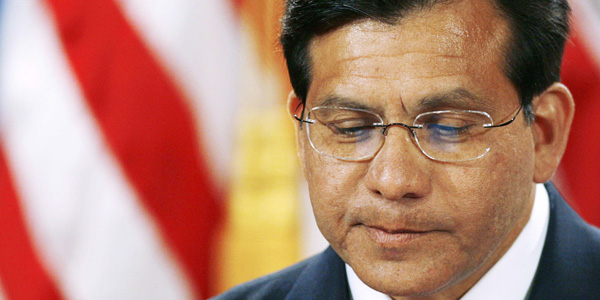The Disappointment(s) of Alberto Gonzales
The former attorney general regrets his role in the U.S. attorneys scandal. Here's what else he should lament.

Reuters/Jim Bourg
Alberto Gonzales, the 80th U.S. attorney general and one of the worst, wants you to know that he is "disappointed" in his conduct surrounding the U.S. attorney scandal, the Bush-era politicization of the Justice Department. Actually, he doesn't necessarily want you to know. Otherwise he long ago would have told you and the rest of the world. Instead, he simply said as much during a deposition in an ongoing Privacy Act case brought (years ago) against government officials.
For the first time, we are told, Gonzales expressed some measure of regret for his role in the ugly affair. Here's how Legal Times reporter Tony Mauro reported the story Tuesday:
"Obviously everyone is smarter in hindsight. In hindsight you wish you would do some things differently and ... I feel disappointment in myself," Gonzales said, according to filings this week in a pending suit filed on behalf of applicants who were rejected for the program for political or ideological reasons. "I, the attorney general, am ultimately responsible," Gonzales also said.
The revelation, such that it was, made me think of all the other things the former Bush official ought to feel "disappointment" about when he considers his contribution to the public life of this country. Here are a few off the top of my head.
1. The Texas clemency memos. As recounted mastefully by Alan Berlow in The Atlantic in 2003, Gonzales, as legal counsel to Texas Governor George W. Bush in the 1990s, "failed repeatedly" to share with his boss pertinent legal issues in the death-penalty cases that came up for review. The record is simply appalling.
2. The torture memos. As White House counsel in 2002, Gonzales authored at least one of the infamous torture memos. His specific argument? That captured Taliban prisoners were not entitled to be treated as prisoners under the Geneva Convention. And why was he writing the memo? Because the Secretary of State had objected to the administration's plans to excise those prisoners from the safeguards of the Conventions. This never was before, and no longer is now, the law of the land.
3. Visiting John Ashcroft in the hospital. In March 2004, we now know, Gonzales and Andrew Card, former president George W. Bush's chief of staff, visited then-Attorney General Ashcroft in an intensive care room. It wasn't to deliver flowers. Instead, the president's men were there to get the ailing attorney general to reauthorize Bush's (still secret back then) domestic-surveillence program. To his eternal credit, Ashcroft turned them down.
4. The U.S. Attorney scandal. Yes, I know. He's disappointed in himself. Here's how the New York Times covered it back in 2007:
As he pressed his case to be confirmed as attorney general, Alberto R. Gonzales made a promise to the Senate Judiciary Committee -- and to the nation at large.
"I will no longer represent only the White House," he testified in 2005 as he prepared to leave his job as White House counsel. "I will represent the United States of America and its people. I understand the differences between the two roles."
Yet in one of his first acts in his new job, Mr. Gonzales brought over two top White House aides and elevated a third, D. Kyle Sampson, a Justice Department staff member who had worked in the White House. Within days, Mr. Sampson began identifying federal prosecutors to oust, an effort initiated by Harriet E. Miers, the fellow Texan who succeeded Mr. Gonzales at the White House.
Is he disappointed in the affirmative role in played in all that (what we know and also what we do not yet know about it)? Or is he disappointed only in the fact that his aides got in trouble? Wouldn't you like to know?
5. His Senate Judiciary Committee performance on April 19, 2007. Attorney General Gonzales came to Capitol Hill during the U.S. attorney scandal, but his answers about his past conduct were so patently incomplete and implausible that senators literally laughed in his face (and talked seriously about perjury charges). The episode was even turned into an hilarious cantata (really). A few months later, Gonzales resigned in disgrace.